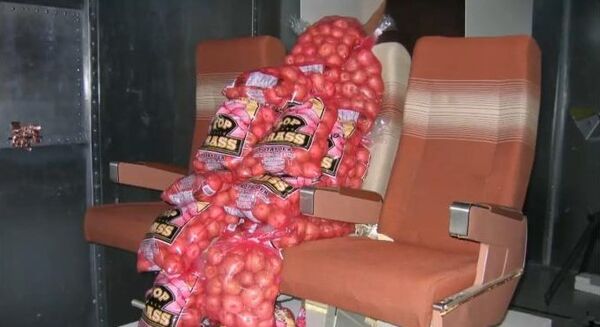WASHINGTON, December 24 (RIA Novosti) – Airline passengers often complain about being treated like sacks of potatoes on board flights, well it turns out, some were replaced by sacks of potatoes.
In order to improve the wireless Internet connection found on its planes, US aircraft maker Boeing conducted experiments substituting passengers with potatoes.
“The team determined that potatoes were ideal stand-ins for passengers, given their similar physical interactions with electronic signal properties,” Boeing said in a press release about the 20,000 pounds (9,071 kg) of potatoes that were used in tests aimed at eliminating weak spots in in-flight wireless signals.
Many airlines offer customers wireless Internet, but the signal strength can be spotty for passengers while 35,000 feet (10,668 meters) up in the air.
Boeing tried to remedy the problem through a series of tests that needed full planes to get accurate signal testing results. The company couldn’t ask people to sit completely still for days while it gathered data, and “that’s where potatoes come into the picture,” Boeing spokesman Adam Tischler told the Associated Press.
The company’s engineers discovered that potatoes absorb and reflect radio wave signals similar to how humans do, and through the project the company’s engineers were able to “more efficiently measure how strong a signal is and how far it spreads, ensuring safe yet powerful signal penetration throughout an airplane cabin,” said Boeing.
Since starting the project in 2006, Boeing said that it has been able to take “advantage of state-of-the-art technology and ground-breaking statistical analysis to identify strong and weak signal areas” in an airplane and fine-tune them to create a more reliable connection for passengers while using personal electronics.
Through the project, dubbed Synthetic Personnel Using Dialectic Substitution (SPUDS), the company has also ensured the improved signals don’t interfere with the plane’s navigation and communications equipment.
A majority of the testing was conducted on a grounded airplane with seats filled with sacks of potatoes arranged to look like lumpy and hefty human beings. The test data was then later validated on the ground with human passengers.
Boeing said that better Wi-Fi signals can already be found on three of its aircraft models flown by major airlines, including the 777, 747-8 and the 787 Dreamliner.


